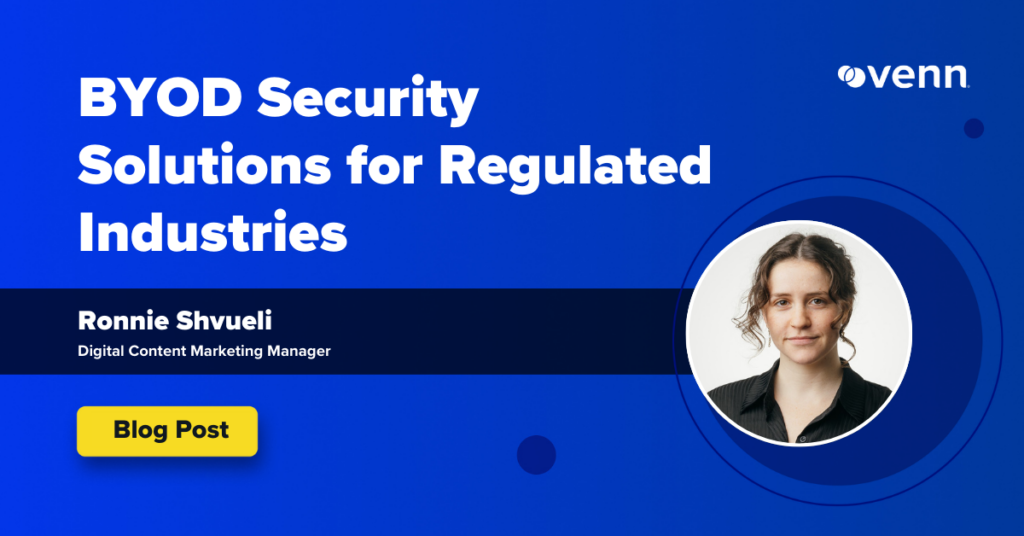Regulated industries like healthcare, finance, and legal are increasingly adopting BYOD (Bring Your Own Device) policies to improve workforce flexibility and reduce IT costs. But protecting sensitive data while meeting stringent regulatory requirements presents unique challenges. BYOD security solutions must not only safeguard enterprise data but also comply with regulations such as HIPAA, SOC 2, FINRA, and GDPR.
This article provides a strategic framework and actionable strategies for evaluating and implementing BYOD security solutions tailored to the needs of IT and InfoSec leaders in regulated industries.
Challenge: Managing Compliance Across Regulated Industries
Companies that fail to maintain compliance can face severe consequences, particularly when it comes to data breaches and regulatory violations.
Ensuring compliance becomes even more complex when employees work on personal laptops. Unlike corporate-managed devices, BYOD laptops introduce variability in security controls, making it harder to enforce consistent policies across an organization. IT teams must ensure that sensitive data remains protected without overstepping into personal privacy, all while meeting industry-specific regulations such as HIPAA, PCI DSS, or GDPR. Without a secure framework in place, organizations risk data leakage, non-compliance penalties, and operational disruptions—especially when employees use unapproved apps or store work data outside sanctioned environments.
The consequences of such missteps are far-reaching. Take the Cash App breach, for example, where an employee maintained access to sensitive data even after termination, leading to a class-action lawsuit that affected millions of customers. This highlights the importance of proper access control and monitoring systems. For organizations managing remote workforces or those with BYOD policies, these risks are amplified.
Healthcare
Maintaining HIPAA compliance while enabling BYOD is a major challenge for healthcare organizations, as personal devices often lack the security of company-owned equipment. Patient records contain highly sensitive data, making them prime targets for cybercriminals. Unauthorized access or transmission through unsecured devices can compromise confidentiality and lead to severe legal and financial consequences. To mitigate these risks, healthcare organizations must enforce strict access controls, encryption, and audit trails to ensure sensitive information remains protected.
Solution: Adopt Robust Security Measures
To ensure HIPAA compliance and protect sensitive patient data, healthcare organizations must implement strong security measures that safeguard personal devices accessing e-PHI. These measures not only reduce the risk of data breaches but also help organizations stay compliant with regulatory requirements.
- Data Encryption
- Data encryption is foundational to protecting sensitive health information. Healthcare organizations must encrypt both data storage and transmission, including emails, messaging apps, cloud storage, and local devices, to prevent unauthorized access. Without encryption, intercepted data could expose patient information and lead to HIPAA violations.
- Multi-factor Authentication (MFA)
- MFA is another critical layer of security that requires users to verify their identity through a combination of passwords, security tokens, or biometrics. This step significantly reduces unauthorized access, even if credentials are compromised.
- Mobile Device Management (MDM) solutions
- MDM solutions help secure personal devices by enforcing policies like device passwords, remote locking, and wiping data if a device is lost or stolen. This minimizes the risk of exposing sensitive data through unauthorized devices.
- Ongoing employee training
- Ongoing employee training on HIPAA compliance and safe device use is essential. Regular security audits help identify weaknesses, ensuring that the organization stays compliant and secure.
- Routine maintenance and security software updates
- Regular software updates, patching vulnerabilities, and securing cloud storage help address evolving threats and maintain a strong security posture, ensuring compliance with HIPAA.
Finance
The financial industry faces strict regulations from bodies like the SEC, FINRA, and SOC 2, making compliance challenging for firms embracing BYOD. Personal devices must meet stringent security standards to prevent data exposure and regulatory violations that could lead to hefty fines or reputational damage. To stay compliant, financial organizations must implement secure communication methods, continuous monitoring, and employee training to protect sensitive financial information.
Solution: Implement Cybersecurity Best Practices
To meet regulatory demands and safeguard financial data, financial institutions must adopt comprehensive cybersecurity practices. These best practices help mitigate risks while ensuring compliance with industry regulations.
- Adopt a Zero-Trust Architecture (ZTA)
- ZTA assumes no one is trusted by default, verifying all access requests before granting them. This reduces the risk of unauthorized access and helps ensure compliance with data protection regulations.
- Implement a Third-Party Risk Management (TPRM) program
- A TPRM program evaluates and secures vendor relationships, requiring regular security assessments to ensure third-party compliance and mitigate data risks.
- Detect and prevent data leaks
- Data leak detection tools monitor for accidental exposures across the surface and dark web. They enable rapid remediation to avoid regulatory breaches and penalties.
- Utilize attack surface monitoring
- Attack surface monitoring tools continuously assess vulnerabilities across digital assets. Early detection and remediation improve overall security and regulatory compliance.
These best practices enable financial institutions to protect sensitive data, minimize compliance risks, and strengthen their cybersecurity posture.
Legal
The rise of BYOD and remote work makes it difficult for law firms to comply with regulations like the ABA Model Rules and GDPR, which mandate strict client data protection. With increasing breaches in the legal industry, firms must balance convenience with confidentiality. Failure to secure client data can lead to financial losses, reputational damage, and legal penalties. To mitigate these risks, law firms must implement strong cybersecurity measures to maintain compliance and protect sensitive information.
Solution: Comprehensive BYOD Policies
To ensure compliance with strict data protection regulations like the ABA Model Rules of Professional Conduct and GDPR, law firms must implement a well-defined BYOD policy. Regulatory and compliance auditors review these policies to verify that personal devices meet security standards and do not compromise client confidentiality. A strong BYOD policy should include:
- Mobile Device Management (MDM)
- Enforce security settings, remote wipe capabilities, and device encryption to protect client data on personal devices.
- Secure Communication Channels
- Require encrypted email, secure client portals, and VPNs to prevent unauthorized access to sensitive communications.
- Access Controls and User Permissions
- Restrict data access based on roles, enforce multi-factor authentication (MFA), and regularly review permissions to prevent unauthorized access.
- Network Security Measures
- Implement firewalls, network segmentation, and real-time monitoring to detect and mitigate security threats.
- Incident Response Plans
- Establish clear protocols for detecting, reporting, and responding to security breaches to minimize damage and ensure compliance.
- Regular Security Audits
- Conduct periodic audits to identify vulnerabilities, ensure policy enforcement, and maintain compliance with industry regulations.
A well-structured BYOD policy not only protects client data but also helps law firms meet compliance requirements while enabling secure remote work.
Challenge: Diverse Device Management
Managing a remote workforce across various personal devices is complex, and VDI often adds to the challenge rather than solving it. Maintaining VDI drains IT resources, while users experience performance lags, unreliable video quality, and frustrating connectivity issues that hinder productivity.
Beyond usability, VDI fails to separate personal and business activities, raising compliance risks and privacy concerns. Its centralized nature broadens the attack surface, making it a prime target for cyber threats. While once a standard for remote security, VDI’s inefficiencies highlight the need for a more adaptable BYOD solution.
Solution: Secure Enclave
A Secure Enclave creates a protected environment within a personal device, isolating sensitive work data from personal applications without the performance issues of VDI. Unlike virtual desktops, which rely on network connectivity and centralized processing, a Secure Enclave runs everything locally, leveraging the device’s own hardware for optimal speed and efficiency. This reduces latency, simplifies IT maintenance, and ensures a seamless user experience while maintaining strict security controls.
By preventing data transfer between the enclave and the personal side of the device, this approach significantly minimizes the attack surface—security vulnerabilities outside the enclave have no impact on protected work data. Additionally, a Secure Enclave allows for instant offboarding, ensuring that when access is revoked, all work-related data is immediately removed without affecting personal files. With its ability to enforce compliance while preserving user privacy, a Secure Enclave is the most effective solution for securing BYOD environments.
Challenge: Shadow IT in Remote BYOD Environments
Shadow IT refers to the use of unauthorized applications and services by employees, often to enhance productivity without waiting for IT approval. Common examples include using personal cloud storage for work files or installing unapproved messaging apps for team communication. While these tools may seem harmless, they introduce security vulnerabilities, increase the risk of data loss, and create compliance challenges.
Remote BYOD environments amplify these risks, as employees have more freedom to choose their own tools without IT oversight. Without proper controls, sensitive company data can be stored in unsecured locations, accessed through unapproved software, or even exposed to malicious applications.
Solution: Clarify BYOD Policies
Clear BYOD policies are essential for minimizing the risks of shadow IT while maintaining security and compliance. To achieve this, organizations should:
- Define approved applications and services for work use.
- Conduct regular audits to identify unauthorized tools.
- Foster employee buy-in by explaining the rationale behind policies.
- Ensure IT teams are accessible and responsive to provide guidance and secure alternatives.
When workers understand the reasoning behind BYOD policies and feel supported rather than restricted, they are more likely to comply. A collaborative approach helps reduce shadow IT while maintaining productivity.
Challenge: Protecting Data Without Violating Privacy
While VDI offers a solution for managing remote work environments, it doesn’t fully address the need to protect user privacy. With VDI, personal data and work data are often mixed, leading to potential privacy violations. Since VDI typically involves centralized server access, it can expose personal data to unnecessary monitoring or access, increasing the risk of privacy breaches. This makes it difficult for organizations to maintain compliance with privacy regulations while ensuring that sensitive work data is protected. Without proper segregation of personal and business information, VDI falls short of safeguarding both security and user privacy.
Solution: Venn’s Blue Border™
Venn protects company data and applications on BYOD computers used by contractors and remote employees. Similar to an MDM solution but for laptops, work lives in a company-controlled Secure Enclave installed on the user’s PC or Mac. In the enclave, all data is encrypted and access is managed. Work applications run locally within the enclave, visually indicated by Venn’s Blue Border™, which isolates and protects business activity while ensuring end-user privacy. This BYOD security solution enables any enterprise, including compliance-driven organizations, to support BYOD while safeguarding both company data and employee privacy.
Secure Compliance and Privacy with Venn
Protecting data in regulated industries requires solutions that not only simplify compliance but also protect sensitive information while respecting employee privacy. Venn provides this by offering a secure, seamless way to enable BYOD without sacrificing security or privacy. With Venn, businesses can ensure compliance in healthcare, finance, law, and other sectors, while maintaining strict control over sensitive data. Deploying Venn is straightforward—its user-guided installation eliminates the need for IT teams to configure and ship devices, making it a simple, efficient solution for organizations of all sizes.
Find out more about Venn’s scalable BYOD security solutions for regulated industries in a short demo.



